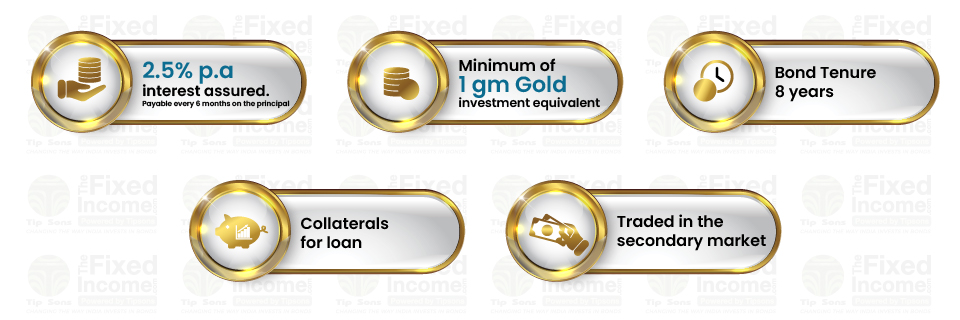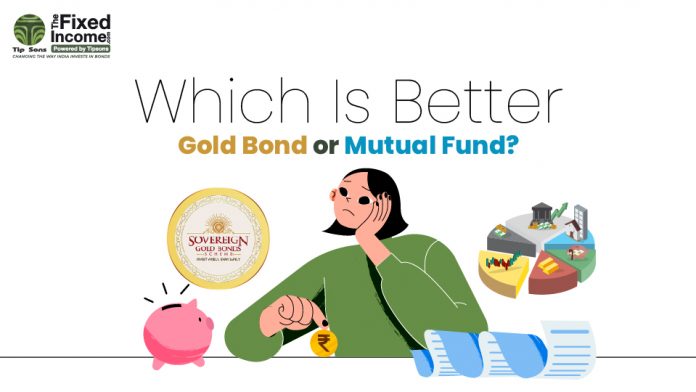If you wish to achieve long-term financial goals, investing in financial instruments is crucial. In India, Gold Bonds and Mutual Funds are popular investment choices, and each comes with its own set of benefits and suitability for various investment objectives. However, choosing between the two can be an incredibly daunting task. Therefore, this blog post aims to compare these two investment options and provide you with the necessary guidance to select the most suitable option for your specific needs.
What are Sovereign Gold Bonds?
Gold bonds are an excellent choice for investors seeking a low-risk investment option. These bonds are backed by the Government of India, ensuring a safer investment choice with minimal risk of default. Sovereign Gold Bonds are government securities expressed in grams of gold i.e. 1 unit of Sovereign Gold Bond is equal to 1 gram of gold.
Investing in Gold Bonds through the SGB Scheme


– The Sovereign Gold Bond (SGB) scheme is a government initiative to encourage investors to invest in gold bonds.
– SGB scheme offers a lower cost of investing in gold, a fixed interest rate, and a tax-free return on investment if held till maturity.
– Investors can invest in gold bonds at a discount of Rs.50 per gram, if applied through online mode, making it a cost-effective option.
– It also offers a fixed interest rate of 2.5% per annum, paid semi-annually, providing a fixed income stream for investors in addition to capital appreciation in the prices of gold.
– Investors who hold gold bonds until maturity are eligible for a tax-free return on investment, reducing their tax liability.
Why Invest in Gold Bonds?
Gold bond investments are becoming more popular in India due to their unique features. The government issues these bonds allowing investors to invest in gold without worrying about storing or securing it themselves. Gold bonds are a relatively new investment option in India, but they offer a promising opportunity.
Crucial Facts to Consider Before Investing in Gold Bonds
- Gold bonds can be bought in paper or demat form from TheFixedIncome.com platform, banks, post offices, and stock exchanges.
- The minimum and the maximum investment is one gram and four kilograms for individuals and Hindu Undivided Families (HUFs), respectively. Further, the maximum limit is 20 kgs for trusts and similar entities as notified by the government from time to time.
- The tenure is eight years, but investors can exit after the fifth year.
How to Buy Gold Bonds
- Gold bonds in India can be bought from TheFixedIncome.com portal, banks, post offices, and stock exchanges.
- The price of these bonds is tied to the current market value of gold.
- Gold bonds can be purchased at the same price as physical gold.
- Investors can buy gold bonds online through the Reserve Bank of India’s website as well.
- This method is convenient as investors can pay through net banking or debit cards.
As an investor, you must understand the process of purchasing Gold Bonds. Additionally, It should be emphasized that sovereign gold bonds can serve as collateral security for availing loans from banks and financial institutions. The loan-to-value ratio will be the same as the standard requirements set by the Reserve Bank of India, similar to any ordinary gold loan.
Understanding Mutual Funds
In India, investing in mutual funds is a popular option because of its numerous benefits. These funds are spread out investments across various assets like stocks, bonds, and commodities to diversify them.
Here is a summary:
– Investors can invest in mutual funds through banks, online platforms, and mutual fund distributors.
– Mutual funds offer diverse options, such as equity funds, debt funds, and hybrid funds.
– Asset diversification is a significant advantage of investing in mutual funds, minimizing the risk of investing in a single asset class.
Additionally, investors can take advantage of the knowledge of well-trained fund managers since professionals manage mutual funds. Given the expansion of the Indian economy and the rise in the number of investment options in the market, mutual funds are expected to continue being a preferred choice for investors in India.
Gold Bonds vs. Mutual Funds: Key Factors to Keep in Mind When Comparing
If you’re trying to decide between gold bonds and mutual funds, weighing their respective benefits and drawbacks is essential. Ultimately, what’s right for you will depend on your goals and how much risk you’re ready to handle.
Returns and Risk
- Gold bonds offer a fixed interest rate of 2.5% per annum, paid semi-annually over and above the capital appreciation in prices of gold.
- Sovereign Gold Bonds have no storage costs and are free from risks associated with physical gold. It serves as a superior alternative to holding physical gold. SGBs are also exempt from issues like the purity of gold, making charges, and GST as faced in the case of physical gold.
- Sovereign gold Bonds are eligible to be used as collateral for loans from financial institutions, banks, NBFCs, etc.
- They are a perfect option for investors looking for a steady income stream.
- Mutual funds can potentially provide high returns but come with higher risks.
- They can be invested in a diversified portfolio of assets, including stocks, bonds, and commodities.
- Investors should evaluate their risk tolerance and investment goals before choosing between them.
Liquidity
- Gold bonds have a term of eight years but can be exited after five years of tenure.
- Sovereign Gold Bonds can also be traded on the exchange if held in the dematerialized form.
- Mutual funds offer greater liquidity.
- Investors can buy and sell mutual fund units on a daily basis.
- For investors who require access to their funds quickly, Mutual funds are a more convenient option.
Taxation
- Gold bonds are exempt from capital gain tax arising for investors when held till maturity of 8 Years. However, the interest income on the sovereign gold bonds is taxable under the normal provisions of tax.
- Whereas Mutual funds are subject to capital gains tax which can reduce returns.
- Mutual funds offer tax-saving options like ELSS to reduce tax liability.
- Consider tax implications before deciding between gold bonds and mutual funds.
Convenience and Accessibility
- Gold bonds and mutual funds should be compared based on convenience and accessibility.
- Gold bonds can be bought from TheFixedincome.com platform, banks, post offices, and stock exchanges in paper or demat form.
- A discount of ₹ 50 per gram than the nominal value will be applicable for investors of Sovereign Gold Bonds (SGB) if applying through online mode.
- Mutual funds can be easily purchased and sold online through various channels, mutual fund distributors, etc.
Diversification
- Finally, diversification is essential when comparing gold bonds and mutual funds.
- Gold bonds are backed by physical gold and expose investors to gold price risks, limiting diversification potential. Nevertheless, it is worth noting that gold has historically been regarded as a safe haven investment. Furthermore, historical data indicates a consistent upward trend in gold prices within the market.
- Mutual funds suggest investing in a diversified portfolio of assets, reducing risk and helping investors achieve their investment goals.
- Investors should evaluate their investment goals and risk tolerance before choosing between gold bonds and mutual funds.
To summarize, investors must carefully consider the abovementioned factors before choosing between gold bonds and mutual funds. While gold bonds provide stable income and tax-free returns, mutual funds offer the possibility of higher returns and greater diversification. Ultimately, the investor’s investment objectives and risk tolerance must dictate the decision between the two.
Remember, before making any investment decision, it’s essential to conduct thorough research, seek advice from financial experts, and align your investment choices with your financial objectives. Only then can you decide correctly and maximize the potential benefits of your investment journey.
Why Choose The Fixed Income?
If you’re seeking investment opportunities in sovereign gold bonds, visit The Fixed Income as the latest tranche of SGB Scheme 2023-24 is live from June 19-23, 2023 on our platform. With extensive coverage of investment options like government bonds, corporate bonds, guaranteed bonds, etc. we are the ideal source for investors aiming to reach their investment objectives and earn fixed returns by investing in bonds.
Investors can easily access a wealth of valuable information on market trends and investment opportunities through our informative blogs, comprehensive information, and personalized assistance from our competent relationship managers. Keeping up with the latest developments in the financial world is vital for making well-informed investment decisions, and our platform provides crucial analysis and insights to assist investors in achieving just that.






















